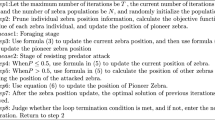Abstract
To insure the multi-input multi-output (MIMO) system has good system response and anti-jamming capability under no decoupling, this paper proposed a self-adaptive shuffled frog leaping algorithm to solve the multivariable PID controller’s optimal tuning problem. First, the mathematical description of optimal tuning problem of multivariable PID controller is given. Second, a modified SFL with a parameter adaptive adjustment strategy in the basis of convergence analysis is proposed to enhance SFL’s global searching ability and to improve its searching efficiency. Finally, a classical simulation example proposed by Wood and Berry is used to compare the performance of our modified SFL with SFL proposed by Thai and wPSO proposed by Shi, and the optimal results of PI/PID controller demonstrate the effectiveness of our algorithm.
Similar content being viewed by others
References
Wang, W., Zhang, J., Chai, T.: A survey of advanced PID parameter tuning methods. ACTA AUTOMATICA SINICA 26(3), 347–355 (2000)
Wang, Q.-G., Zou, B., Lee, T.-H., Bi, Q.: Auto-tuning of multivariable PID controllers from decentralized relay feedback. Automatica 33(3), 319–330 (1997)
Luyben, W.L.: A simple method for tuning SISO controllers in a multivariable system. Ind. Eng. Chem. Product Res. Dev. 25, 654–660 (1986)
Chen, D., Seborg, D.E.: Design of decentralized PI control systems based on Nyquist stability analysis. J. Process Control 13(1), 27–39 (2003)
Huynh, T.-H.: A modified shuffled frog leaping algorithm for optimal tuning of multivariable PID controllers. In: IEEE International Conference on Industrial Technology, (ICIT 2008), pp. 1–6 (2008)
Chang, W.-D.: A multi-crossover genetic approach to multivariable PID controllers tuning. Expert Syst. Appl. 33(3), 620–626 (2007)
Willhuice Iruthayarajan, M., Baskar, S.: Evolutionary algorithms based design of multivariable PID controller. Expert Syst. Appl. 36(5), 9159–9167 (2009)
Han, K., Zhao, J., Xu, Z.-H., Qian, J.-X.: A closed-loop particle swarm optimizer for multivariable process controller design. J. Zhejiang Univ. SCIENCE A 9(8), 1050–1060 (2009)
Wang, J., Gao, X.: Design of multivariable PID controller of electroslag remelting process based on improved shuffled frog leaping algorithm. Control Decis. 26(11), 1731–1734 (2011)
Menhas, M.I., Wang, L., Fei, M., Pan, H.: Comparative performance analysis of various binary coded PSO algorithms in multivariable PID controller design. Expert Syst. Appl. 39(4), 4390–4401 (2012)
Willjuice Iruthayarajan, M., Baskar, S.: Covariance matrix adaptation evolution strategy based design of centralized PID controller. Expert Syst. Appl. 37(8), 5775–5781 (2010)
Reynoso-Meza, G., Sanchis, J., Blasco, X., Herrero, J.M.: Multiobjective evolutionary algorithms for multivariable PI controller design. Expert Syst. Appl. 39(9), 7895–7907 (2012)
Eusuff, M.M., Lansey, K.E.: Optimization of water distribution network design using the shuffled frog leaping algorithm. J. Water Resour. Plan. Manage. 129(3), 210–225 (2003)
Elbeltagi, E., Hegazy, T., Grierson, D.: Comparison among five evolutionary-based optimization algorithms. Adv. Eng. Inform. 19(1), 43–53 (2005)
Xiao, Y., Li, B.-H., Chai, X., Wang, Q.: Convergence Analysis of shuffled frog leaping algorithm and its modified algorithm. J. Huazhong Univ. Sci. Technol. (Nat. Sci. Ed.) 40(7), 15–18 (2012)
Acknowledgements
This work is supported by the Foundation item of Project supported by the National High-Tech R&D Program, China (No. 2015AA042101).
Author information
Authors and Affiliations
Editor information
Editors and Affiliations
Rights and permissions
Copyright information
© 2016 Springer Science+Business Media Singapore
About this paper
Cite this paper
Xiao, Y., Li, B.H., Lin, T., Hou, B., Shi, G., Li, Y. (2016). A Self-adaptive Shuffled Frog Leaping Algorithm for Multivariable PID Controller’s Optimal Tuning. In: Zhang, L., Song, X., Wu, Y. (eds) Theory, Methodology, Tools and Applications for Modeling and Simulation of Complex Systems. AsiaSim SCS AutumnSim 2016 2016. Communications in Computer and Information Science, vol 643. Springer, Singapore. https://doi.org/10.1007/978-981-10-2663-8_1
Download citation
DOI: https://doi.org/10.1007/978-981-10-2663-8_1
Published:
Publisher Name: Springer, Singapore
Print ISBN: 978-981-10-2662-1
Online ISBN: 978-981-10-2663-8
eBook Packages: Computer ScienceComputer Science (R0)




